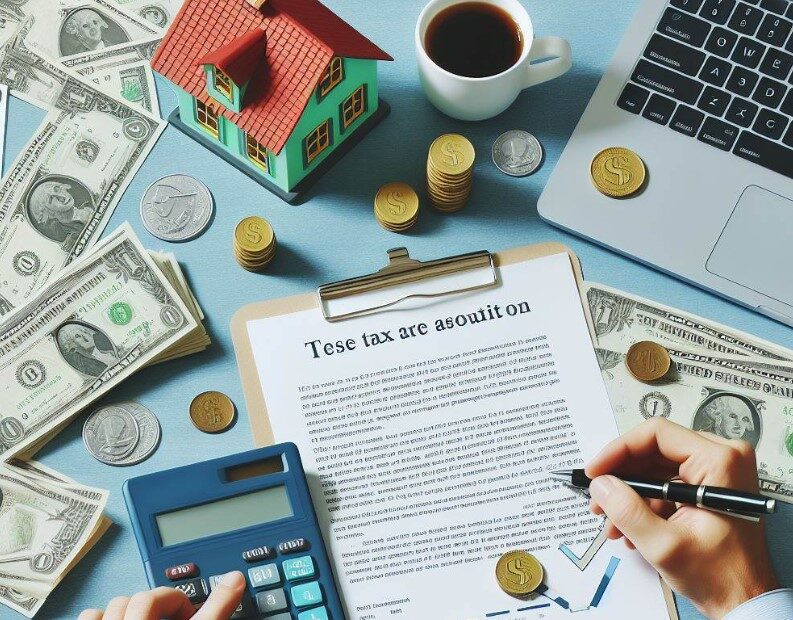When it comes to How To Write A Property Tax Appeal Letter? the first step is understanding your local property tax assessment process. Property taxes are based on the assessed value of your property. If you believe this assessment is inaccurate, an appeal letter is your formal way to contest it. This letter should be clear, concise, and backed by solid evidence.
Key Takeaways
- Understand the appeal process and deadlines in your area.
- Gather relevant documentation, including property assessments and comparable property values.
- Structure your letter clearly, focusing on factual evidence and concise arguments.
- Address the letter to the appropriate authority and follow up as needed.
How To Write A Property Tax Appeal Letter?
Writing a property tax appeal letter involves several key steps. Each step is crucial to ensure that your appeal is clear, compelling, and correctly submitted. Here’s a breakdown of the process:

- Understand Your Assessment and Deadlines:
- Before you begin, it’s essential to understand how your property was assessed and the deadline for submitting an appeal. This information is usually available on your property tax assessment notice or from your local tax assessor’s office.
- Gather Evidence:
- Collect evidence that supports your claim that the property tax assessment is incorrect. This can include:
- Recent sales data of comparable properties in your area.
- A recent appraisal of your property.
- Photographs or documents showing any overlooked flaws or issues with your property.
- Any records of recent improvements or lack thereof.
- Collect evidence that supports your claim that the property tax assessment is incorrect. This can include:
- Research Local Tax Laws and Appeal Process:
- Familiarize yourself with the local property tax laws and the specific appeal process for your area. This can usually be found on your local government or tax assessor’s website.
- Write the Appeal Letter:
- Start with your contact information and the date.
- Address the letter to the appropriate department or individual.
- Include specific details about your property, such as the address and parcel number.
- Clearly state that you are appealing your property tax assessment.
- Present your evidence in a clear, concise, and logical manner. Explain why you believe the assessment is incorrect, using your gathered evidence to support your points.
- Be polite and professional in tone.
- Request a specific action, such as a reassessment or a review of your case.
- Review and Edit Your Letter:
- Before sending, review your letter for clarity, grammar, and tone. Ensure all facts are accurate and all necessary documentation is included.
- Submit the Letter:
- Follow the specific submission guidelines provided by your local tax assessor’s office. This might include mailing a physical copy, submitting online, or both.
- Keep Records and Follow Up:
- Keep a copy of the letter and all accompanying documents for your records.
- Follow up if you do not receive a response within the expected timeframe. Be prepared to provide additional information if requested.
- Prepare for a Possible Hearing:
- If your case proceeds to a hearing, prepare to present your argument and evidence in person. Practice explaining your points clearly and concisely.
- Continue Paying Your Property Taxes:
- It’s important to continue paying your property taxes as billed during the appeal process to avoid penalties or interest.
- Respond to the Outcome:
- Once a decision is made, review the outcome. If your appeal is successful, ensure the new assessment is reflected in your tax bill. If denied, you can consider further action, such as requesting a review or consulting a professional.
Remember, each jurisdiction may have specific requirements or steps in the appeal process. It’s crucial to adhere to these local guidelines to ensure your appeal is valid and considered.
Understanding the Property Tax Assessment Process
Before writing your appeal, it’s essential to understand how properties are assessed in your jurisdiction. This knowledge will help you identify potential errors in your assessment.
Researching Your Local Tax Laws
Local tax laws can significantly influence the property tax assessment process. Research these laws to understand your rights and the assessor’s responsibilities.
Identifying Assessment Errors
Common errors in property tax assessments include incorrect property measurements or overlooked depreciating factors. Identifying such errors can be a key point in your appeal.
Preparing to Write Your Appeal Letter
Preparation is critical. Gather all necessary documents, such as your property tax bill, assessment notice, and any evidence supporting your case.

Collecting Relevant Documents
Collect property records, recent sales of comparable properties, and any other relevant information. This documentation will form the basis of your appeal.
Understanding Comparative Property Values
Understanding the market value of similar properties in your area is crucial. This comparison can highlight discrepancies in your property’s assessed value.
Structuring Your Property Tax Appeal Letter
A well-structured letter is more likely to be considered seriously. Make sure your letter is logically organized and easy to follow.
Opening Statement
Begin with a clear statement of your purpose: appealing the property tax assessment. Include your property’s identification details.
Presenting Your Argument
Lay out your argument logically. Use your gathered evidence to support your claim that the assessment is incorrect.
Addressing the Letter and Follow-up
Address your letter to the correct authority, usually the local tax assessor’s office. Ensure you know the appeal deadline and plan accordingly.
Proper Addressing and Submission
Address the letter to the specific person or department handling appeals. Double-check the submission guidelines.
Following Up on Your Appeal
After submitting your appeal, follow up periodically. Keep records of all correspondence related to your appeal.
Crafting Persuasive Arguments in Your Appeal
Your appeal letter must contain persuasive arguments that clearly state why your property’s assessed value should be reconsidered.

Highlighting Discrepancies in Assessment
When crafting your argument, focus on any discrepancies between your property’s assessment and those of similar properties. Compare features like size, location, condition, and age. Presenting concrete examples of how your property differs from others, yet is assessed similarly, can be a powerful argument.
Utilizing Appraisals and Expert Opinions
Including recent appraisals or expert opinions can significantly strengthen your appeal. These professional assessments provide authoritative evidence that supports your claim, making your argument more credible.
Effective Communication Tactics
The tone and clarity of your letter can greatly impact its effectiveness. It’s important to communicate your points professionally and respectfully.
Maintaining a Professional Tone
While it’s understandable to feel frustrated or upset about your tax assessment, it’s crucial to maintain a professional tone in your letter. Avoid emotional language and stick to factual, respectful communication. This approach increases the likelihood that your appeal will be taken seriously.
Clarity and Conciseness
Your letter should be clear and to the point. Avoid unnecessary jargon and overly complex sentences. The goal is to make your case as understandable and compelling as possible to the assessor.
Addressing Common Misconceptions
Many homeowners have misconceptions about the property tax appeal process. Addressing these can help in preparing a more effective appeal.
The Role of Tax Assessors
Understand that tax assessors are not intentionally overvaluing properties but are following protocols and guidelines. Knowing this can help you approach your appeal from a more informed and objective standpoint.
The Impact of Successful Appeals
Some homeowners worry that appealing their property tax assessment might lead to negative repercussions, such as targeted reassessments. However, this is a misconception. Tax authorities are required to base assessments on factual data, and your appeal is a legitimate part of this process.
Post-Submission Strategies
After submitting your appeal, there are strategies to enhance the chances of a successful outcome.

Monitoring the Appeal Process
Stay informed about the status of your appeal. Understanding the review process can help manage your expectations and prepare for possible outcomes.
Preparing for a Hearing
If your appeal progresses to a hearing, prepare to present your case succinctly and confidently. Practice explaining your arguments clearly and have all your supporting documents organized and readily available.
Leveraging Technology in Appeals
In the digital age, technology can play a pivotal role in preparing and submitting your property tax appeal.
Utilizing Online Resources
Many jurisdictions now offer online portals for property tax appeals. These platforms can simplify the submission process and provide valuable resources for homeowners.
Digital Documentation
Organize and submit your supporting documents digitally, if possible. This can make your submission process more efficient and ensure that all your evidence is easily accessible to the assessors.
Conclusion
In conclusion, writing a property tax appeal letter requires a clear understanding of the assessment process, meticulous preparation, and a well-structured argument.
By focusing on these elements and providing factual evidence, you increase your chances of a successful appeal. Remember, the key is to present a logical, evidence-based case to effectively contest your property tax assessment.
Frequently Asked Questions
How do I know if my property is over-assessed?
Compare your property’s assessed value with recent sales of similar properties in your area. If your property’s value is significantly higher, it might be over-assessed. Reviewing your property’s features and conditions compared to others can also provide insights.
Should I still pay my property taxes during the appeal process?
Yes, it’s important to continue paying your property taxes as billed. If your appeal is successful, you may be eligible for a refund or credit.
Can appealing my property tax affect my mortgage?
If your appeal leads to a lower assessment and thus lower property taxes, it could potentially lower your escrow payment if your mortgage includes an escrow account for taxes. However, the impact on your mortgage itself is typically negligible.
How long does the property tax appeal process take?
The duration varies, but it can take several weeks to several months from submission to resolution. It depends on the specific procedures of your local tax assessor’s office.
A multifaceted professional, Muhammad Daim seamlessly blends his expertise as an accountant at a local agency with his prowess in digital marketing. With a keen eye for financial details and a modern approach to online strategies, Daim offers invaluable financial advice rooted in years of experience. His unique combination of skills positions him at the intersection of traditional finance and the evolving digital landscape, making him a sought-after expert in both domains. Whether it’s navigating the intricacies of financial statements or crafting impactful digital marketing campaigns, Daim’s holistic approach ensures that his clients receive comprehensive solutions tailored to their needs.









